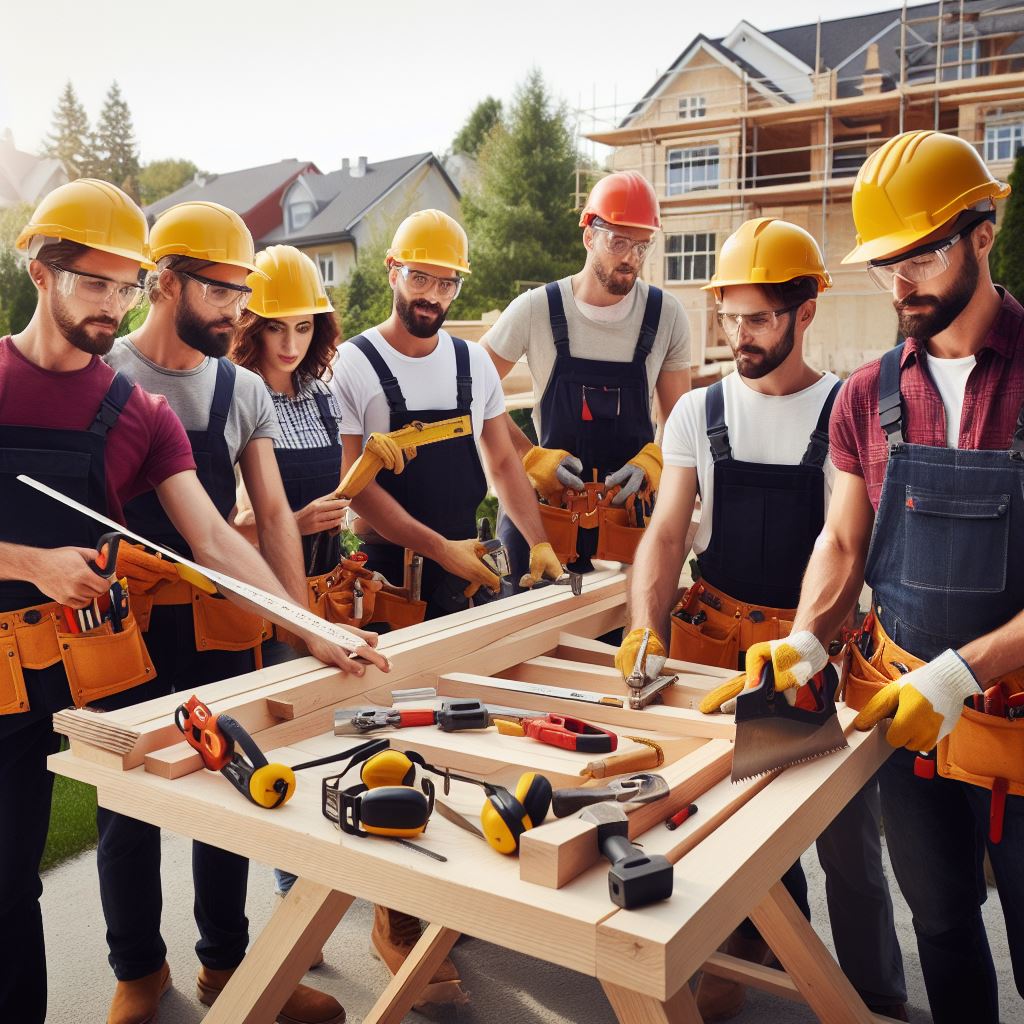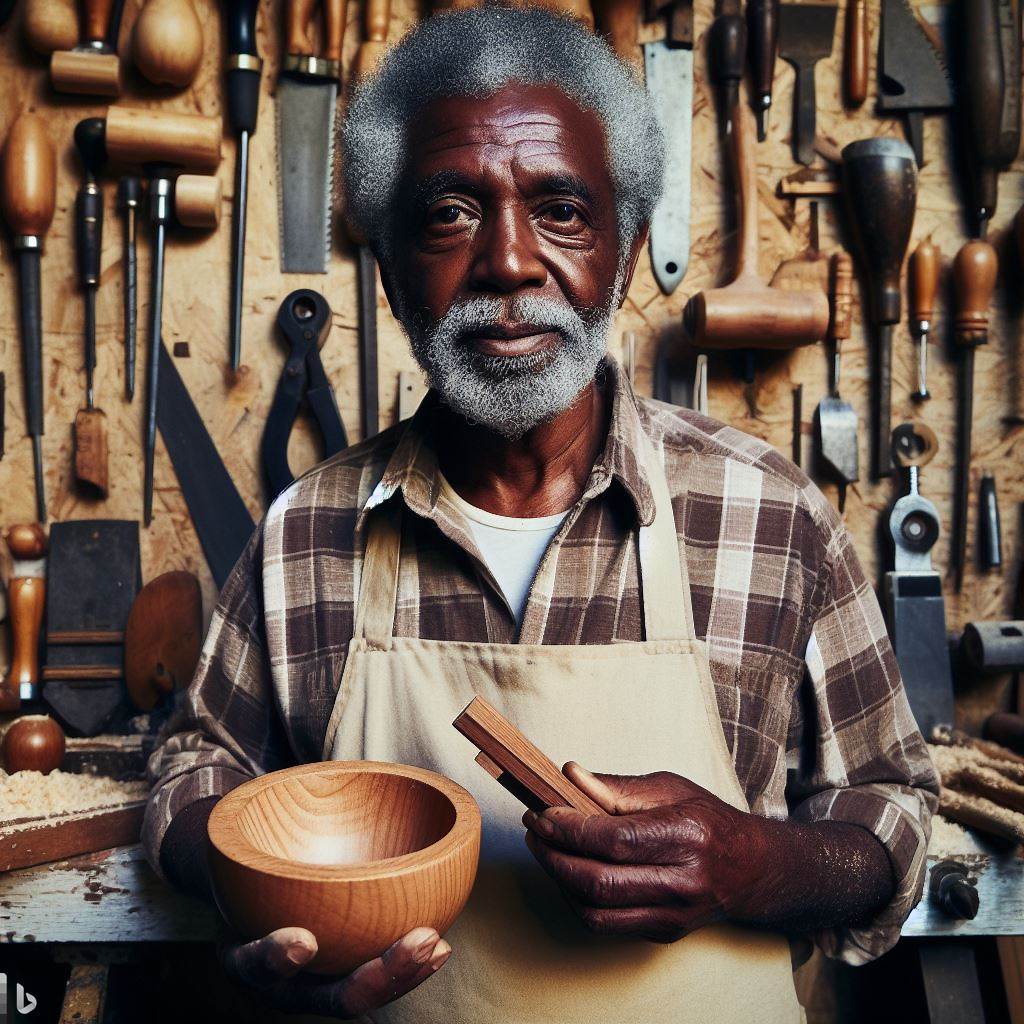Introduction
A master carpenter is a highly skilled professional who excels in woodworking and craftsmanship.
They possess a deep understanding of the trade, and their expertise extends beyond basic carpentry skills.
Master carpenters are able to conceptualize, design, and create intricate pieces of furniture and structures that showcase their exceptional talent.
Becoming a master carpenter is important for several reasons.
Firstly, it establishes a higher level of credibility and recognition in the industry.
Clients and employers seek out master carpenters for their ability to deliver exceptional quality and attention to detail.
Additionally, achieving the status of a master carpenter opens up more opportunities for higher-paying jobs and collaborations with renowned designers and architects.
This blog post aims to provide a comprehensive guide to becoming a master carpenter.
We will explore the necessary steps and skills required, including advanced joinery techniques, precision measurement, and the use of specialized tools.
Additionally, we will discuss the importance of continuous learning and apprenticeship programs for aspiring master carpenters.
In essence, becoming a master carpenter requires dedication, passion, and a commitment to honing one’s skills.
The journey towards mastery is not easy, but the rewards are great.
This blog post will serve as a valuable resource for those seeking to achieve this esteemed title and excel in the world of carpentry.
Understanding the Journey of a Master Carpenter
Apprenticeship
An apprenticeship is a structured training program, providing hands-on experience, skills, and knowledge, typically in a specific trade or profession.
Its primary purpose is to equip individuals with practical expertise, fostering their career development while meeting the labor market’s demand for skilled workers.
Apprenticeships offer hands-on learning.
They provide real-world skills, allowing individuals to learn while working. Apprentices gain valuable experience.
These programs combine education with practical training. Apprenticeships bridge the gap between theory and application.
They prepare participants for successful careers.
Apprentices work alongside experienced professionals. This fosters skill development and industry-specific expertise.
Transform Your Career Today
Unlock a personalized career strategy that drives real results. Get tailored advice and a roadmap designed just for you.
Start NowOverall, apprenticeships enhance employability and create well-rounded professionals.
Experienced carpenters provide invaluable mentorship and guidance, imparting their knowledge and skills to aspiring woodworkers.
This hands-on apprenticeship fosters craftsmanship.
Education and Training
Vocational schools and trade programs offer carpentry education.
They teach essential skills, including woodworking and construction techniques. Students gain hands-on experience through practical projects.
These programs prepare individuals for successful careers in carpentry. Graduates often find employment in the construction industry.
Carpentry education focuses on hands-on training.
Students learn essential skills, like measuring, cutting, and joining wood. The curriculum covers safety procedures and tool handling.
Carpentry coursework includes framing, finishing, and blueprint reading. Apprenticeships often supplement classroom learning.
Students gain practical experience on real construction projects. This education prepares individuals for careers in carpentry.
Carpentry professionals must meet specific certification and licensing requirements.
These requirements vary by location, ensuring safety and competence in the field.
Prospective carpenters typically complete vocational training and apprenticeships, followed by examinations and, in some cases, ongoing education to maintain their credentials.
Licensing regulations help protect consumers and maintain industry standards, promoting the expertise and reliability of carpenters.
Compliance with these requirements is crucial for those entering the carpentry profession, as it guarantees their qualifications and the quality of their work.
Experience and Skill Development
Individuals actively engage in multiple projects and assignments, acquiring invaluable experience and enhancing their skills.
Carpenters can boost expertise by specializing in areas like cabinetry, framing, or furniture making. Focused training sharpens their skills.
Staying updated with industry trends is crucial for professionals. Continual learning ensures relevance and adaptability in a dynamic marketplace.
Read: Crafting the Future: Carpenter Apprenticeships in the US
Showcase Your Business Today
Reach thousands of readers actively exploring professional services. Publish your business profile and grow your audience now.
Publish NowEssential Skills and Knowledge for Master Carpenters
Master carpenters possess a range of essential skills and knowledge that sets them apart from their peers.
These skills can be broadly categorized into technical skills, problem-solving skills, and communication and leadership skills.
Technical Skills
Proficiency in using carpentry tools and equipment is a fundamental requirement for a master carpenter.
They must be adept at handling a variety of tools, including saws, drills, measuring devices, and power tools.
Understanding carpentry techniques and joinery is also crucial.
Master carpenters should be skilled in creating different types of joints, such as butt joints, dovetail joints, and mortise and tenon joints.
In addition to practical skills, master carpenters must have the ability to read and interpret blueprints and construction plans.
This skill allows them to understand the project requirements and specifications, ensuring accuracy and precision in their work.
They need to be familiar with common symbols, measurements, and notation used in carpentry and construction.
Problem-solving Skills
Master carpenters are adept at identifying and resolving construction challenges.
They have the experience and knowledge to handle unexpected problems that may arise during a project. This could include issues with structural integrity, material compatibility, or design adjustments.
They must be able to analyze the situation and devise effective solutions to ensure the successful completion of the project.
Adapting to unforeseen circumstances is another important skill for master carpenters.
Construction projects often come with unexpected changes, such as design alterations, material shortages, or weather-related delays.
A master carpenter should be flexible and capable of adjusting plans and strategies accordingly, without compromising the quality of the work.
Communication and Leadership Skills
Effective communication is crucial for master carpenters.
They need to be able to communicate clearly and efficiently with clients, team members, and other stakeholders involved in the project.
This includes discussing project requirements, and addressing any concerns or issues that may arise.
Strong communication skills help to foster trust and collaboration, contributing to the overall success of the project.
Master carpenters often lead a team of carpenters and other workers.
They are responsible for coordinating tasks, assigning roles, and ensuring that the project progresses smoothly.
Leadership skills are essential in motivating and guiding team members, maintaining a positive work environment, and achieving project goals within the specified timeframe.
Time management and resource efficiency are also critical skills for master carpenters.
They must be able to allocate resources effectively, including materials, tools, and labor, to maximize productivity and minimize waste.
Efficient time management ensures that projects are completed on schedule, meeting client expectations and maintaining a good reputation in the industry.
Overall, the combination of technical skills, problem-solving abilities, and communication and leadership skills makes master carpenters highly sought after professionals in the construction industry.
Their expertise and knowledge contribute to the successful execution of projects, resulting in well-crafted, and visually appealing structures.
Read: American Carpentry: The Art & Craft Behind Custom Woodwork
Steps to Achieve Master Carpenter Status
Mastering carpentry requires a combination of dedication, skill, and experience.
It is not an easy feat to achieve, but with the right steps and mindset, anyone can strive to become a master carpenter.
This section will outline the essential steps to take on the journey towards achieving master carpenter status.
Setting Goals and Aspirations
The first step towards becoming a master carpenter is to set clear goals and aspirations in the field of carpentry.
This involves identifying both personal and professional goals that align with your passion for woodworking and craftsmanship.
Take the time to reflect on what you hope to achieve within the carpentry industry and visualize the career path you desire.
Seeking Apprenticeship Opportunities
Apprenticeship programs provide invaluable hands-on experience and mentorship from experienced carpenters.
Research and apply to apprenticeship programs in your area, and network with established professionals in the industry.
Building connections with those who have already mastered the craft can provide you with opportunities for growth and learning.
Pursuing Education and Training
While hands-on experience is crucial in becoming a master carpenter, it is equally important to pursue formal education and training.
Find suitable trade schools or vocational programs that offer comprehensive carpentry courses.
Enroll in relevant classes and workshops to acquire technical knowledge and enhance your skills in woodworking techniques, safety protocols, and construction principles.
Showcase Your Business Today
Reach thousands of readers actively exploring professional services. Publish your business profile and grow your audience now.
Publish NowBuilding Experience and Skills
Gaining practical experience and honing your skills are fundamental to becoming a master carpenter.
Seek employment opportunities within the carpentry industry, whether it be through construction companies or specialized woodworking shops.
By taking on challenging projects and assignments, you can further develop your expertise and craftsmanship, making strides towards mastery.
Obtaining Certification and Licensing
To solidify your status as a master carpenter, consider obtaining professional certification and licensing.
Research the necessary requirements for certification in your jurisdiction, which may include a certain number of years of experience, completion of specific carpentry courses, and passing certification exams.
Adhering to these requirements and successfully completing the exams will showcase your competence and dedication within the field.
Embarking on the path to becoming a master carpenter is a journey that requires commitment and perseverance.
By setting clear goals, seeking apprenticeship opportunities, pursuing education and training, building experience and skills.
And obtaining certification and licensing, you can steadily progress towards achieving master carpenter status.
Remember, mastery is not solely defined by technical skill but also by a deep understanding, appreciation, and love for the art of carpentry.
Read: Specialized Niches: Exploring Unique Carpentry Fields

Advantages and Opportunities of Being a Master Carpenter
Professional Recognition and Prestige
- Master carpenters are highly respected within the construction industry.
- They have the skills and expertise to handle complex woodworking projects efficiently.
- Being recognized as a master craftsman brings a sense of pride and accomplishment.
- Clients and peers view master carpenters as leaders in their field.
- Master carpenters often have the opportunity to work on high-profile projects.
Higher Earning Potential
- Master carpenters can command higher salaries compared to regular carpenters.
- The advanced skills and experience they possess demand a higher pay scale.
- Clients are willing to pay a premium for the quality and craftsmanship provided by master carpenters.
- Master carpenters can also earn additional income by offering specialized services.
- Their reputation and expertise contribute to higher earning potential.
Opportunities for Entrepreneurship and Self-Employment
- As a master carpenter, one has the freedom to pursue self-employment or start their own business.
- They can choose to work independently, taking on projects based on their interests and preferences.
- Being their own boss allows master carpenters to set their own hours and business terms.
- Entrepreneurship offers the opportunity to fully utilize their skills and creativity.
- Master carpenters who start their own businesses can also hire and train apprentices, passing on their knowledge.
Continuing Education and Growth
- Master carpenters understand the importance of continuous learning and improvement.
- They keep up with industry trends, new materials, and techniques through regular training.
- Continuing education allows master carpenters to expand their skill set and stay competitive.
- By staying updated, they can offer their clients the latest innovations and design options.
- This commitment to growth ensures that master carpenters remain at the top of their craft.
In fact, becoming a master carpenter provides numerous advantages and opportunities.
The professional recognition and prestige associated with this title bring respect and admiration from peers and clients.
Master carpenters also have the potential to earn higher wages and take on more complex and rewarding projects.
They can pursue entrepreneurship and self-employment, enjoying the freedom and flexibility that come with it.
Additionally, continuing education and growth ensure they stay ahead of industry trends and provide the best possible services to their clients.
Overall, being a master carpenter is a pathway to a fulfilling and prosperous career in the woodworking industry.
Read: How to Launch Your Carpentry Business in the USA
Conclusion
Summary of key points discussed
In this section, we have explored the concept of being a Master Carpenter and how to achieve this title.
We discussed the skills and qualities required, as well as the dedication and hard work needed to master the craft.
We also examined the importance of continuous learning and improving our skills. Encouragement for aspiring carpenters to pursue the Master Carpenter path
If you aspire to become a Master Carpenter, do not be discouraged by the challenges ahead.
Instead, let them fuel your passion and determination. Know that every step you take on this path will bring you closer to achieving excellence in your craft.
Stay focused, never stop learning, and surround yourself with mentors who can guide you.
Final thoughts on the importance and rewards of mastering the carpentry craft
Mastering the carpentry craft goes beyond simply honing your skills. It is about becoming a true artisan, creating works of art with your hands.
It is about leaving a legacy that will last for generations. The rewards of this journey are not just monetary; they are the satisfaction of turning raw materials into something beautiful and functional.
Becoming a Master Carpenter is a lifelong pursuit, but the journey is worth it. It is a noble calling that requires patience, discipline, and a commitment to excellence.
So, if you have a passion for woodworking, don’t settle for mediocrity. Strive to be a Master Carpenter, and let your creativity flourish.
[E-Books for Sale]
The Big Book of 500 High-Paying Jobs in America: Unlock Your Earning Potential
$19.99 • 500 High-Paying Jobs • 330 pages
Explore 500 high-paying jobs in America and learn how to boost your career, earn more, and achieve success!
See All 500 High-Paying Jobs of this E-Book
1001 Professions Without a Degree: High-Paying American Jobs You Can Start Now
$19.99 • 1001 Professions Without a Degree • 174 pages
Discover 1001 high-paying jobs without a degree! Unlock career tips, skills, and success strategies for just $19.99!




